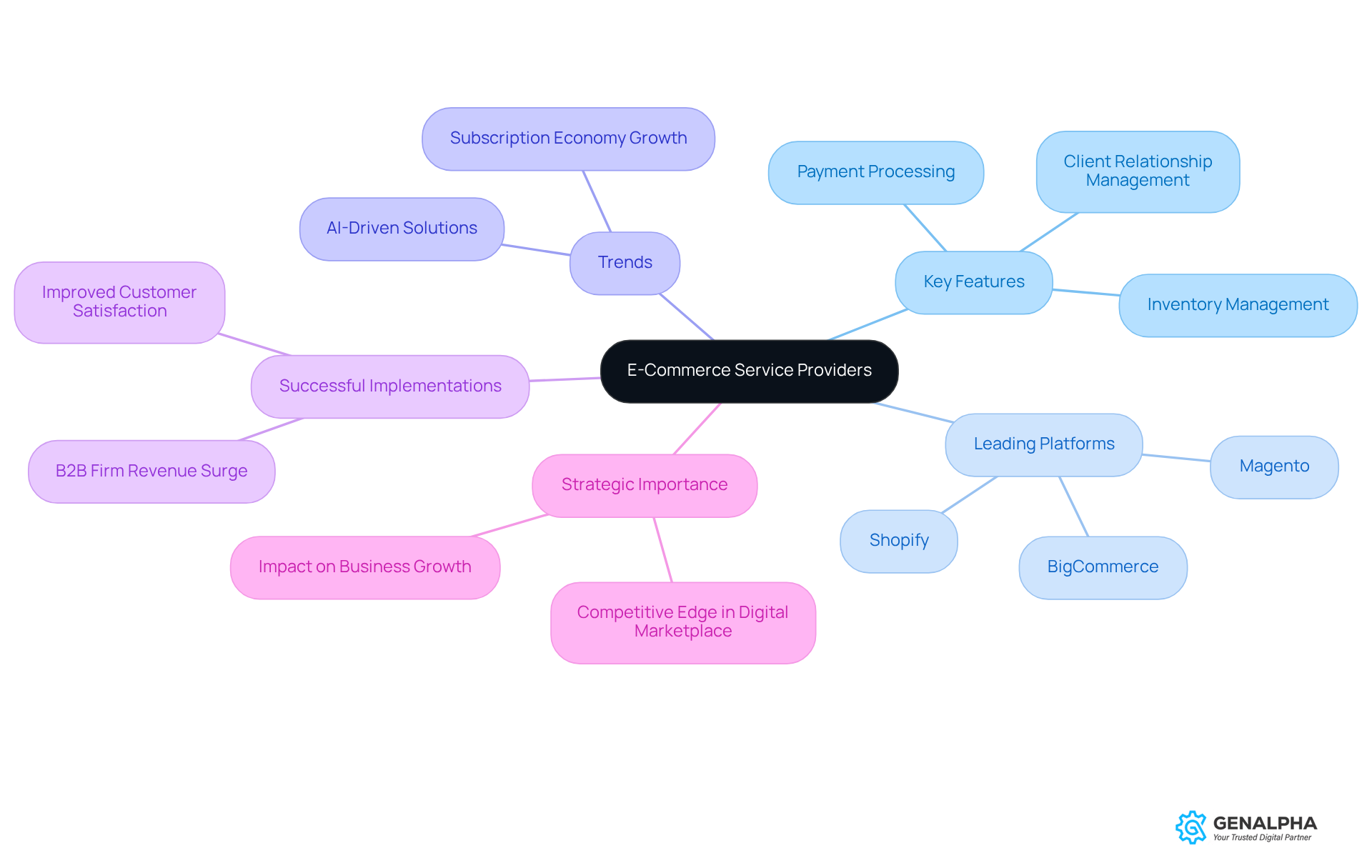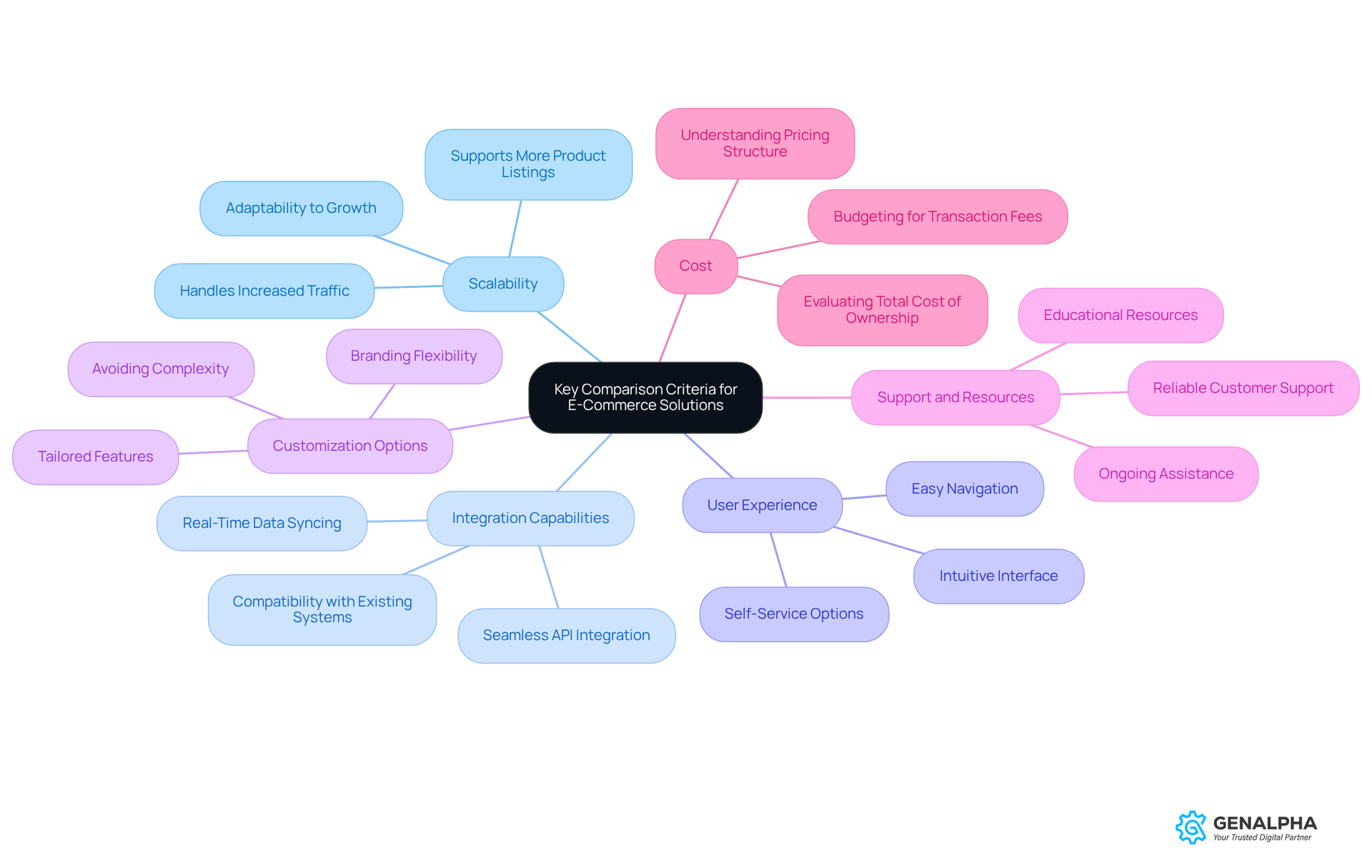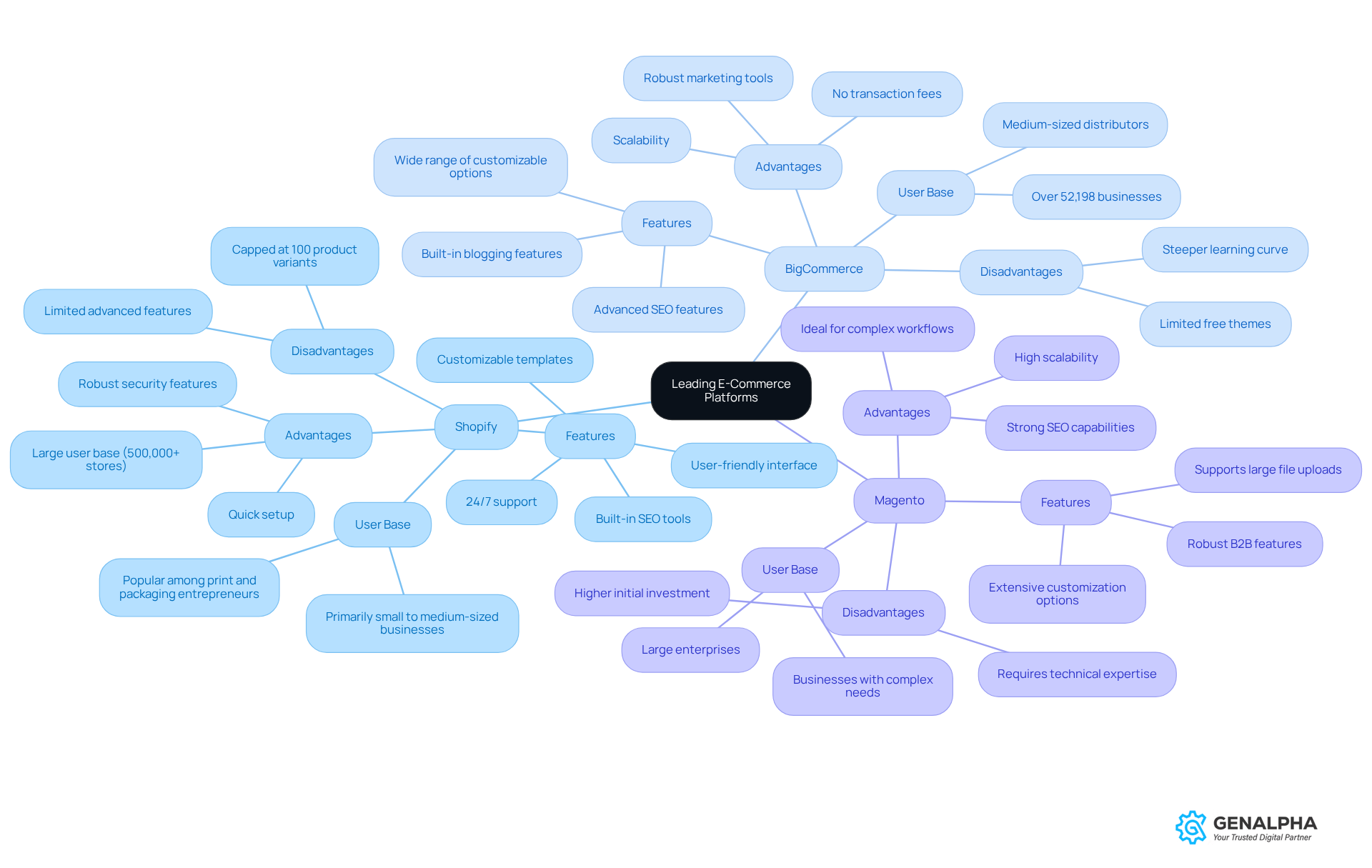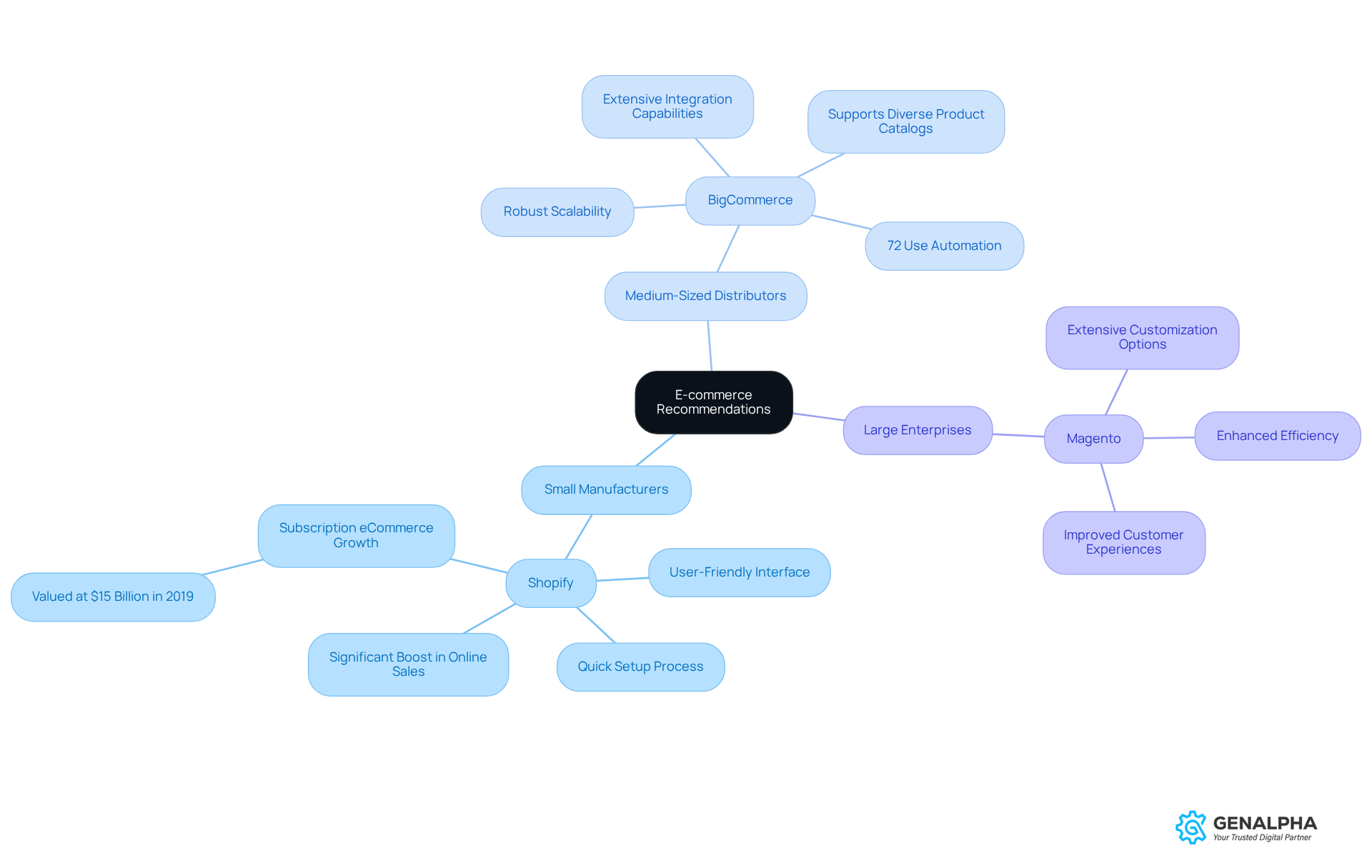Overview
This article dives into the world of e-commerce service providers specifically for manufacturers and distributors. Have you ever wondered how the right platform can supercharge your sales efficiency and boost customer satisfaction? We’ll explore that by breaking down essential criteria like:
- Scalability
- Integration capabilities
- User experience
- Customization options
Plus, we’ll share tailored recommendations for businesses of all sizes, showcasing how platforms like Shopify, BigCommerce, and Magento can meet your unique operational needs. Ready to find the perfect fit for your business?
Introduction
Have you noticed how quickly e-commerce is changing the game for manufacturers and distributors? The way they do business has been completely transformed, making the choice of the right service provider a crucial decision.
With platforms like Shopify, BigCommerce, and Magento leading the charge, businesses now have access to a variety of features that can boost operational efficiency and enhance customer engagement.
But with the digital landscape constantly evolving, how can companies sift through these options to find the perfect fit for their unique needs?
In this article, we’ll explore the key criteria for comparing e-commerce service providers, offering insights that could shape the future of online sales for manufacturers and distributors alike.
Let’s dive in!
Understanding E-Commerce Service Providers
Service providers e commerce are like the secret sauce for boosting online sales. They offer crucial features such as inventory management, payment processing, and client relationship management that can really make a difference for businesses. Think about it: for producers and suppliers, selecting the right service providers e commerce is not just a choice—it significantly impacts sales efficiency and customer satisfaction.
As we look ahead to 2025, platforms like Shopify, BigCommerce, and Magento are leading the charge, each with their own unique features tailored to different business needs. Have you noticed the recent trend towards AI-driven solutions? It’s all about giving users more control, reflecting the fast-evolving landscape of B2B online commerce.
Successful implementations of these systems have shown impressive boosts in operational efficiency and client engagement. For instance, one B2B firm revamped its online sales setup and saw a surge in revenue and customer satisfaction—all without ditching its core ERP system. Isn’t that inspiring?
Industry leaders emphasize that choosing the right service providers e commerce is more than just a technical decision; it’s a strategic move that can drive growth and give you a competitive edge in the digital marketplace. And with the subscription economy projected to reach $1.2 trillion by 2030, the importance of selecting an efficient online sales system is more critical than ever. So, what are you waiting for? Let’s dive into the world of e-commerce and find the right fit for your business!

Key Comparison Criteria for E-Commerce Solutions
When you're diving into e-commerce solutions, there are a few key things to keep in mind:
-
Scalability: Think about how the system can grow with your business. It’s crucial for producers and suppliers who want to expand. A scalable e-commerce system adapts to changing demands, making sure you can handle increased traffic and product listings without a hitch. Did you know that 39% of manufacturers see revenue growth as a perk of using e-commerce solutions? That really highlights how important scalability is!
-
Integration Capabilities: You’ll want a system that plays well with your existing ERP systems. Seamless integration is the name of the game for keeping things running smoothly. Platforms that support API integrations allow for real-time data syncing, helping manufacturers streamline their processes and boost productivity. For instance, look at Heineken’s success with the Virto Commerce platform—effective integration can really ramp up efficiency and profits.
-
User Experience: A friendly interface can make all the difference in customer satisfaction, which often leads to more sales. Features like easy navigation, self-service options, and live order tracking create a positive shopping experience that’s vital for keeping customers coming back in a competitive landscape.
-
Customization Options: It’s important to have a platform that can be tailored to fit your specific needs. Customization plays a key role in branding and functionality. Focus on essential features that boost scalability and simplify upgrades—avoid adding unnecessary complexity that could slow you down.
-
Support and Resources: Reliable customer support and educational resources can significantly impact the success of your e-commerce setup. Ongoing support means you can tackle issues quickly, keeping your operations flowing smoothly.
-
Cost: Don’t forget to understand the pricing structure, including transaction fees and subscription costs. It’s essential for effective budgeting. Make sure to evaluate the total cost of ownership to see if the system fits your financial goals.
These criteria provide a solid framework for assessing different online retail systems offered by service providers e-commerce. By considering these factors, manufacturers and distributors can make informed decisions that support their digital transformation journeys with the help of service providers e-commerce. What do you think? Are there any other criteria you’d add to the list?

Comparative Analysis of Leading E-Commerce Platforms
Let's dive into a comparative analysis of three leading e-commerce platforms that are great for manufacturers and distributors.
-
Shopify: If you're looking for a user-friendly interface and a quick setup, Shopify is a fantastic choice. It's especially beneficial for businesses that want to get up and running fast. With a variety of customizable templates and robust 24/7 support, it's accessible even for those without technical know-how. Did you know that Shopify supports over 500,000 online stores worldwide? That speaks volumes about its popularity among small to medium-sized enterprises! However, while it shines in ease of use, it might not offer the advanced features that larger manufacturers need, like extensive product variant management and deep customization options.
-
BigCommerce: This platform really stands out for its scalability and integration capabilities, making it a solid pick for medium-sized distributors. With a client base of over 52,198 companies, BigCommerce provides advanced SEO features and a wide range of customizable options that can significantly boost your online visibility and sales. But here's the catch: new users might find the learning curve a bit steep due to its more complex interface and features, which could be challenging for those new to online retail.
-
Magento (Adobe Commerce): Now, if you're after extensive customization and robust features, Magento is your go-to. It's perfect for organizations with specific operational needs, supporting complex workflows and offering features tailored for B2B commerce, like account-based pricing and bulk order management. With around 185,679 websites using Magento, its presence in the industry is undeniable. However, it does require a greater level of technical expertise to manage effectively, which might pose a challenge for smaller manufacturers without dedicated IT resources.
Each of these platforms has its own set of advantages and disadvantages, making it crucial for companies to assess their unique needs against what these providers offer. User satisfaction ratings show that while Shopify is loved for its simplicity and support, BigCommerce is recognized for its scalability, and Magento is favored by those who need deep customization and control. As one industry expert put it, "Choosing between Magento and Shopify involves more than merely picking a platform — it’s about discovering the right match for your enterprise’s unique requirements." So, which platform resonates with you?

Recommendations Based on Business Needs
Based on a thorough comparative analysis, let’s dive into some tailored recommendations for different business needs:
-
For Small Manufacturers: Have you considered Shopify? It really stands out as a fantastic choice because of its user-friendly interface and quick setup process. It’s perfect for businesses just starting their e-commerce journey. Success stories show that small manufacturers using Shopify have enjoyed significant boosts in online sales, with many reporting increased customer engagement and retention. Plus, did you know the subscription eCommerce industry was valued at $15 billion in 2019? That’s some serious growth potential for services like Shopify!
-
For Medium-Sized Distributors: Now, let’s talk about BigCommerce. It’s a robust option that offers scalability and extensive integration capabilities. This system lets distributors grow without sacrificing functionality, which is key for those looking to enhance their online presence. Industry leaders highlight that BigCommerce’s flexibility supports diverse product catalogs and complex pricing structures—essential for medium-sized operations. And here’s a fun fact: 72% of successful eCommerce companies are using automation in their workflows. It really shows how important these features are for boosting operational efficiency!
-
For Large Enterprises: If you’re a large manufacturer with complex operational needs, Magento might be the way to go. Its extensive customization options allow companies to tailor the system to their specific requirements, ensuring all aspects of their online sales strategy are covered. Companies using Magento have reported enhanced efficiency and improved customer experiences, proving it’s effective for larger-scale operations.
Ultimately, when choosing the right e-commerce platform, it’s crucial to align it with your business’s size, growth ambitions, and the operational needs of service providers e commerce. This alignment will facilitate a successful digital transformation. So, what’s your next step?

Conclusion
Choosing the right e-commerce service provider is a big deal for manufacturers and distributors aiming to thrive in the digital marketplace. As we've explored in this article, the platform you pick can really shape your operational efficiency, customer satisfaction, and, in the end, your business growth. With the e-commerce landscape constantly changing, it's crucial to understand the unique features and capabilities of popular platforms like Shopify, BigCommerce, and Magento to make smart decisions.
When evaluating e-commerce solutions, key criteria like:
- Scalability
- Integration capabilities
- User experience
- Customization options
- Support
- Cost
come into play. Each platform has its own perks tailored to different business sizes and needs. For instance, Shopify is fantastic for small manufacturers due to its ease of use, while Magento offers extensive customization for larger enterprises. This comparative analysis highlights how important it is to align your chosen platform with your specific operational needs and growth goals.
In today's fast-paced e-commerce environment, the importance of selecting the right service provider can't be stressed enough. As you navigate your digital transformation journey, it's essential to leverage these insights and recommendations to make strategic choices that will drive growth and enhance customer experiences. Embracing the right e-commerce solution isn't just about keeping pace; it's about setting your business up for long-term success in a competitive landscape. So, what will your next step be?
Frequently Asked Questions
What are e-commerce service providers?
E-commerce service providers are companies that offer essential features such as inventory management, payment processing, and client relationship management to enhance online sales for businesses.
Why is choosing the right e-commerce service provider important for businesses?
Selecting the right e-commerce service provider significantly impacts sales efficiency and customer satisfaction, making it a crucial decision for producers and suppliers.
What are some leading e-commerce platforms as of 2025?
As of 2025, leading e-commerce platforms include Shopify, BigCommerce, and Magento, each offering unique features tailored to different business needs.
What is the trend towards AI-driven solutions in e-commerce?
The trend towards AI-driven solutions in e-commerce focuses on giving users more control and adapting to the fast-evolving landscape of B2B online commerce.
How can implementing e-commerce systems affect a business?
Successful implementations of e-commerce systems can lead to impressive boosts in operational efficiency and client engagement, resulting in increased revenue and customer satisfaction.
What is the projected growth of the subscription economy by 2030?
The subscription economy is projected to reach $1.2 trillion by 2030, highlighting the importance of selecting an efficient online sales system for businesses.
How should businesses approach the selection of e-commerce service providers?
Businesses should view the selection of e-commerce service providers as a strategic move that can drive growth and provide a competitive edge in the digital marketplace.




